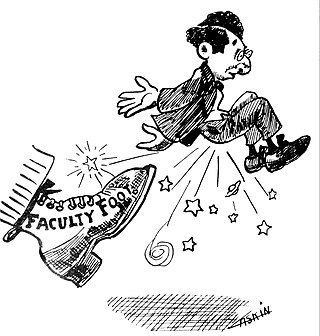A film crew is a group of people, hired by a production company, for the purpose of producing a film or motion picture. The crew is distinguished from the cast, as the cast are understood to be the actors who appear in front of the camera or provide voices for characters in the film. The crew is also separate from the producers, as the producers are the ones who own a portion of either the film studio or the film's intellectual property rights. A film crew is divided into different departments, each of which specializes in a specific aspect of the production. Film crew positions have evolved over the years, spurred by technological change, but many traditional jobs date from the early 20th century and are common across jurisdictions and filmmaking cultures.

Quid pro quo is a Latin phrase used in English to mean an exchange of goods or services, in which one transfer is contingent upon the other; "a favor for a favor". Phrases with similar meanings include: "give and take", "tit for tat", "you scratch my back, and I'll scratch yours", and "one hand washes the other". Other languages use other phrases for the same purpose.
Delegation is the process of distributing and entrusting work to another person. In management or leadership within an organisation, it involves a manager aiming to efficiently distribute work, decision-making and responsibility to subordinate workers in an organization. Delegation may result in creation of an accountable chain of authority where authority and responsibility moves down in an organisational structure. Inefficient delegation may lead to micromanagement.
A performance appraisal, also referred to as a performance review, performance evaluation, (career) development discussion, or employee appraisal, sometimes shortened to "PA", is a periodic and systematic process whereby the job performance of an employee is documented and evaluated. This is done after employees are trained about work and settle into their jobs. Performance appraisals are a part of career development and consist of regular reviews of employee performance within organizations.
Career development refers to the process an individual may undergo to evolve their occupational status. It is the process of making decisions for long term learning, to align personal needs of physical or psychological fulfillment with career advancement opportunities. Career Development can also refer to the total encompassment of an individual's work-related experiences, leading up to the occupational role they may hold within an organization.
Gaffer or Gaffa may refer to:

Set construction is the process undertaken by a construction manager to build full-scale scenery, as specified by a production designer or art director working in collaboration with the director of a production to create a set for a theatrical, film, or television production. The set designer produces a scale model, scale drawings, paint elevations, and research about props, textures, and so on. Scale drawings typically include a groundplan, elevation, and section of the complete set, as well as more detailed drawings of individual scenic elements which, in theatrical productions, may be static, flown, or built onto scenery wagons. Models and paint elevations are frequently hand-produced, though in recent years, many Production Designers and most commercial theatres have begun producing scale drawings with the aid of computer drafting programs such as AutoCAD or Vectorworks.

Dismissal is the termination of employment by an employer against the will of the employee. Though such a decision can be made by an employer for a variety of reasons, ranging from an economic downturn to performance-related problems on the part of the employee, being fired has a strong stigma in some cultures.
Span of control, also called span of management, is a term used in business management, particularly human resource management. The term refers to the number of subordinates or direct reports a supervisor is responsible for.
Power distance is the unequal distribution of power between parties, and the level of acceptance of that inequality; whether it is in the family, workplace, or other organizations.
A retail manager is the person ultimately responsible for the day-to-day operations of a retail store. All employees working in the store report to the retail/store manager. A store manager reports to a district/area or general manager.
Organizing or organising is the establishment of effective authority-relationships among selected works, persons and workplaces in order for a group to work together efficiently, or the process of dividing work into sections and departments, which often improves efficiency.
A flat organization is an organizational structure with few or no levels of middle management between staff and executives. An organizational structure refers to the nature of the distribution of the units and positions within it, and also to the nature of the relationships among those units and positions. Tall and flat organizations differ based on how many levels of management are present in the organization and how much control managers are endowed with.
Office administration is a set of day-to-day activities that are related to the maintenance of an office building, financial planning, record keeping and billing, personal development, physical distribution and logistics, within an organization. An employee that undertakes these activities is commonly called an office administrator or office manager, and plays a key role in any organization's infrastructure, regardless of the scale. Many administrative positions require the candidate to have an advanced skill set in the software applications Microsoft Word, Excel and Access.
A toxic leader is a person who has responsibility for a group of people or an organization, and who abuses the leader–follower relationship by leaving the group or organization in a worse condition than it was in. Good and bad leadership styles can propagate downwards in an organisation, and there may therefore be little support to be gained by reporting toxic leadership upwards in the hierarchy.

Maverick! : The Success Story Behind the World's Most Unusual Workplace is a business autobiography by Ricardo Semler published in 1993 by Warner Books. The book relates the management succession and increasingly unorthodox ethos of Semco, which grew to become one of Brazil's largest conglomerates.
Organizational conflict, or workplace conflict, is a state of discord caused by the actual or perceived opposition of needs, values and interests between people working together. Conflict takes many forms in organizations. There is the inevitable clash between formal authority and power and those individuals and groups affected. There are disputes over how revenues should be divided, how the work should be done, and how long and hard people should work. There are jurisdictional disagreements among individuals, departments, and between unions and management. There are subtler forms of conflict involving rivalries, jealousies, personality clashes, role definitions, and struggles for power and favor. There is also conflict within individuals – between competing needs and demands – to which individuals respond in different ways.
Employee silence refers to situations where employees withhold information that might be useful to the organization of which they are a part, whether intentionally or unintentionally. This can happen if employees do not speak up to a supervisor or manager.
Within organizations people often have to make decisions about whether to speak up or remain silent - whether to share or withhold their ideas, opinions, and concerns ... [The problem is that] in many cases, they choose the safe response of silence, withholding input that could be valuable to others or thoughts that they wish they could express.
— Frances J. Milliken and Elizabeth Wolfe Morrison, Shades of Silence: Emerging Themes and Future Directions for Research on Silence in Organizations

The term director is a title given to the senior management staff of businesses and other large organizations.
Managing Up and Managing Down is a part of management that details how middle managers or supervisors should effectively deal with their managers and subordinates. Promotion to management comes with additional responsibility of managing down. With the additional responsibility for managing their team while remaining accountable to their management teams, managers require additional skills and training to effectively influence up or down. Management levels within large organizations are structured from a hierarchal organization and include senior, middle, and lower management roles.





